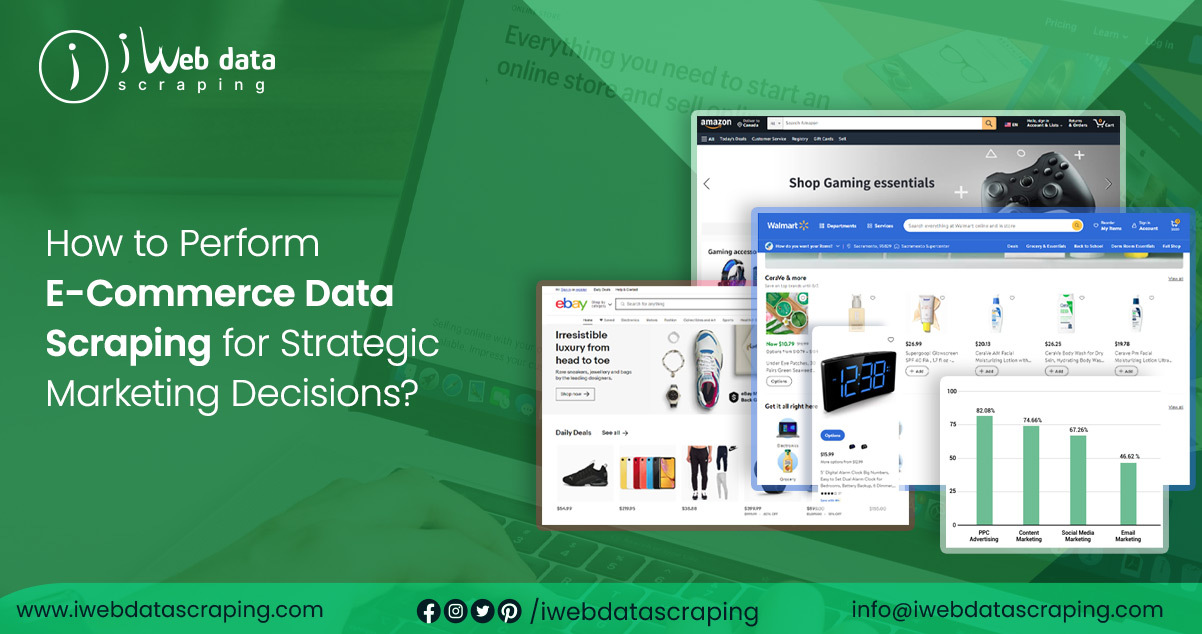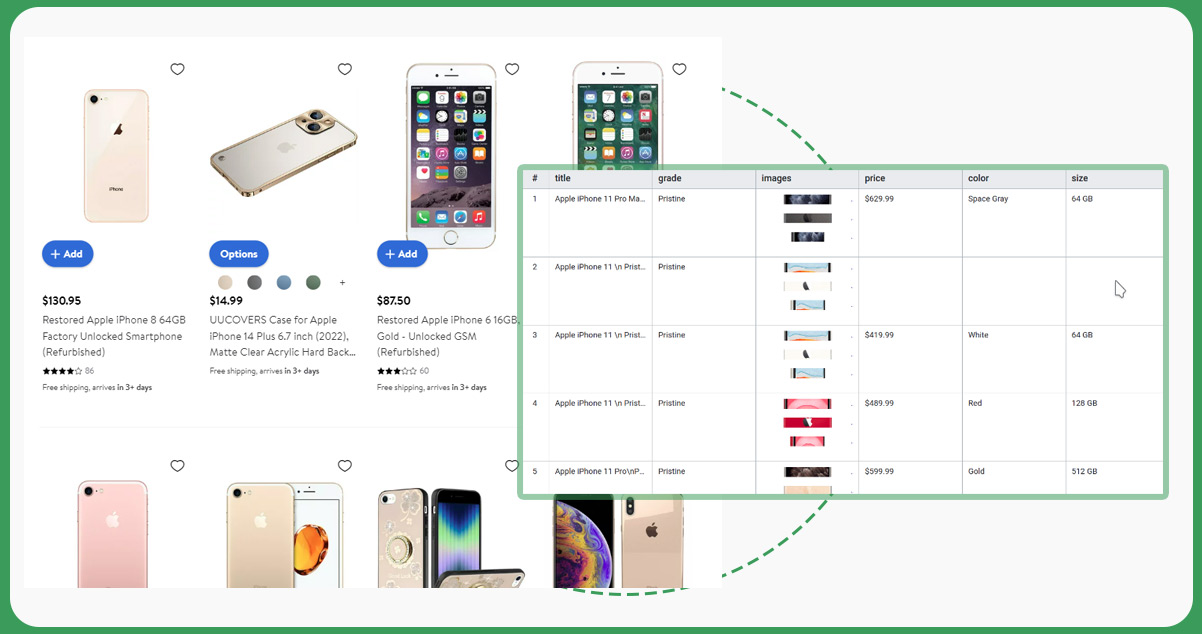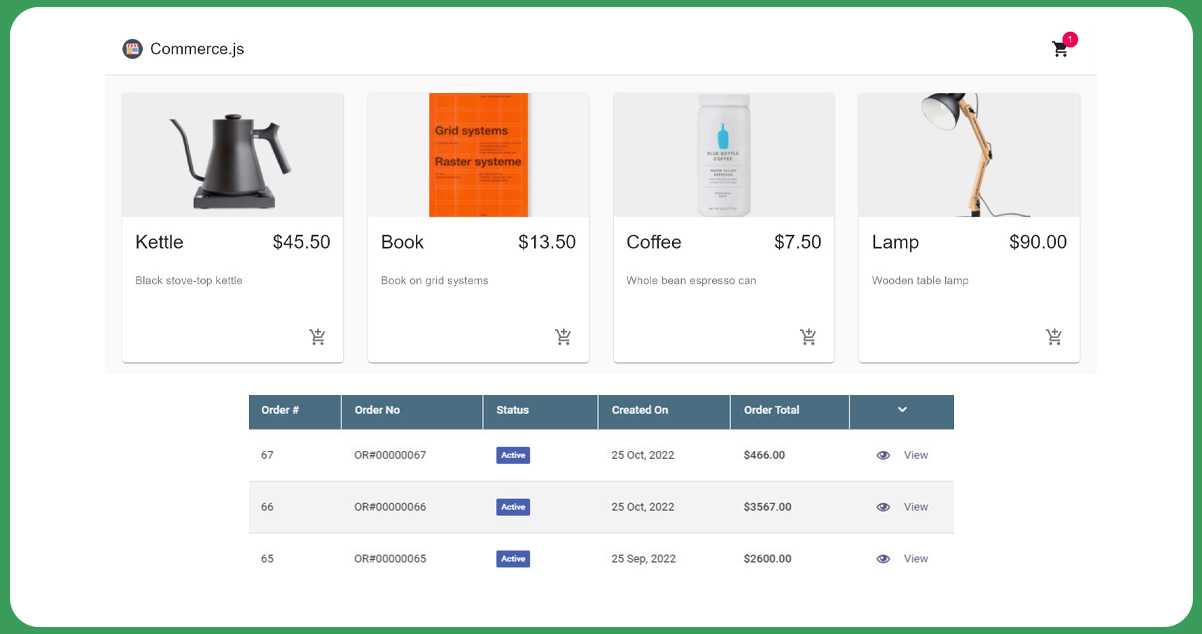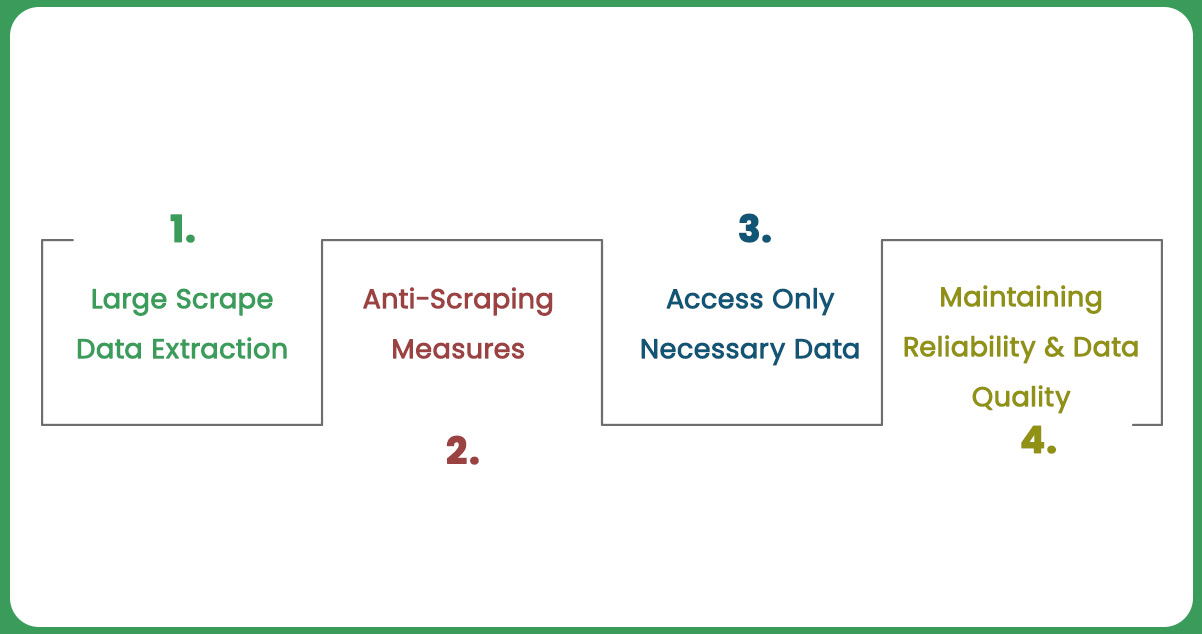

In the competitive realm of online business, global competition is fierce, and being well-prepared is essential. Projections for 2023 indicate significant growth in business-to-consumer e-commerce sales, estimated to reach 8.9% and nearly $6 trillion in total volume. It is crucial to leverage cutting-edge technology for gathering high-quality, relevant information and gain an edge over competitors, establish customer trust, and build a recognizable brand,
Among the drivers of e-commerce growth, web scraping practices play a significant role. They empower companies to make informed, strategic decisions based on valuable web data, leading to increased revenue and a deeper understanding of customer needs. In the data-driven landscape of online retail, website scraping can propel a brand to become a dominant player.

E-commerce data scraping refers to the wide range of information collected from e-commerce platforms and online marketplaces. This data encompasses various types, including:
Customer Data: This includes demographic details, search terms, interests, preferences, and other relevant information that helps businesses understand their target audience better.
Product Data: It involves details about products available for sale, such as price ranges, stock availability, delivery options, customer ratings, and more. This information aids companies in managing their product offerings effectively.
Web scraping eCommerce data enables businesses to track market trends, monitor competitor activities, and make informed decisions by comparing their performance with their rivals.

Web scraping has emerged as a widely recognized and indispensable strategy extensively utilized by e-commerce companies for gathering valuable product information. By employing web scraping techniques, businesses can gain insights into customer preferences and detect patterns in online purchasing behavior. Leading online retailers like Amazon, Walmart, Shopify, and eBay, among others, have derived significant benefits from web scraping and continue to do so.
Web scraping using eCommerce data scraper proves to be a powerful tool for extracting product information and capturing diverse web data, including payment options, and conducting social media sentiment analysis.
Here are key reasons why e-commerce businesses should consider seeking professional eCommerce data scraping services:
Competitor Price Monitoring: Web scraping plays a crucial role in conducting competitor price research, which has emerged as a primary application of this technique. With a significant 94% of online shoppers comparing prices before making a purchase, it becomes essential for businesses to engage in thorough research and set their prices strategically to optimize conversions. Scrape eCommerce data to gain valuable insights into the overall product pricing landscape within the marketplace. This information allows them to conduct in-depth research on competitors, analyze pricing trends, and customize their pricing strategies, promotions, and sales campaigns accordingly. Web scraping eCommerce sites empowers businesses to make informed decisions by providing comprehensive and up-to-date pricing data. By leveraging this information, companies can fine-tune their pricing strategies, optimize conversions, and gain a competitive edge in the ever-evolving e-commerce landscape.
Analyze Product Performance: By leveraging retail and customer data, including reviews and feedback, businesses can effectively track product development within the marketplace and focus on continuous improvement. Businesses can gain valuable insights by comparing their product and similar offerings data from competitors, including understanding the product's perceived value in the marketplace, positioning relative to competitors, and identifying profitable product segments.
Collecting data on customer sentiment, opinions, preferences, and likes provides businesses with a wealth of information. It enables them to align their product development and marketing strategies with market demands and trends, leading to increased productivity and profitability.
Enhanced Marketing Strategy: Web scraping tools are valuable for product improvement and developing more effective, personalized, targeted advertisements. Businesses gain insights into consumer behavior, opinions, and preferences by harnessing the extensive information gathered through web scraping using eCommerce API.
Forecasting Future Trends: Data scraping from Ecommerce websites plays a crucial role in helping organizations develop effective and successful strategies for the future. By extracting data from the internet, businesses gain valuable insights that open up numerous opportunities for tailored business projects aligned with their desired market position.
With a comprehensive understanding of the market, its key players, and consumer behavior, businesses can leverage web-scraped data to create accurate forecasts of future market trends. Organizations can make informed predictions and shape their strategies by analyzing current metrics and trends.
Customer Sentiment Analysis: In every business, understanding and targeting the interests and preferences of your customers is essential. To achieve this, access to a vast amount of information is crucial. Scraping products from eCommerce websites proves invaluable in identifying and understanding your ideal customers, their preferences, and even the most minor details about them. By leveraging web-scraped data, businesses can gather comprehensive insights allowing personalized content creation and improved customer engagement. This process involves identifying customer demographics, analyzing reviews and social media sentiment, and building detailed customer personas and profiles. Such information empowers businesses to develop more effective marketing and advertising campaigns.

The rate at which companies gather user data is staggering. Even simple information like age or online activity can provide valuable insights for building essential strategies and a roadmap for your business.
Successful personalization relies on the complex processing of big data. Metrics are not just for long-term planning but also powerful tools for day-to-day operations. Real-time information is crucial for timely decision-making. The critical applications of real-time metrics include:

Large Scrape Data Extraction: Large-scale data extraction poses a significant challenge for e-commerce store owners regarding web scraping. Imagine managing an e-commerce platform with over 20 subcategories within a single primary category, resulting in hundreds of products. Moreover, such a platform typically has 15 to 20 main product categories. Extracting data for all these products from various subcategories is time-consuming and monotonous leading to poor data quality and accuracy.
Filtering and refining such a massive amount of data through manual methods like spreadsheets and data analysis becomes daunting, hindering the extraction of actionable insights and other necessary information.
There are two viable options to address this challenge:
Creating an in-house team of specialists involves assembling a dedicated team responsible for data collection and analysis. However, this approach can still be labor-intensive and monotonous for the team members, resulting in potential efficiency and accuracy issues.
Utilizing a web scraping tool: Opting for a reliable tool allows an in-house team to focus solely on ensuring the tool collects the correct data. It is only possible using an intuitive web scraping tool streamlines the process, delivering improved results with less effort. It offers user-friendly interfaces and robust security measures and minimizes maintenance costs.
Anti-Scraping Measures: Data collection itself is not inherently illegal or prohibited. However, website owners often take measures to protect their data from unauthorized access, including using CAPTCHA and other web scraping protections to deter bots from accessing their information.
Access Only Necessary Data: In e-commerce, product prices, and features often vary based on the user's location. Companies must query each product from different locations to obtain accurate and location-specific information. It introduces an additional layer of complexity when setting up an e-commerce web scraping proxy pool, as it requires a diverse range of proxies from various locations. By utilizing automated methods for proxy selection, companies can efficiently manage their proxy pool, ensuring that each web scraping project accesses the necessary proxies based on the targeted locations. This automated approach simplifies the process, reduces manual effort, and optimizes the data collection process, leading to more accurate and relevant insights.
Maintaining Reliability & Data Quality: When it comes to web scraping, ensuring the quality and reliability of the collected data is of utmost importance. Data integrity issues can hinder its usefulness for marketing purposes and competitiveness in the marketplace. Common challenges include scattered data from various sources, repetitive or outdated information, and even intentional misinformation by e-commerce sites targeting web scrapers.
Several steps are there to address these concerns and maintain data quality when scraping:
Evaluate the effectiveness of the data scraping bot: Regularly assess the performance of the scraping bot to ensure it is accurately extracting the desired data.
Establish a robust proxy management infrastructure: Implementing a reliable proxy management system helps mitigate potential IP blocking or restrictions issues.
Implement automated quality assurance: By automating QA processes, you can validate the scraped data, identify any inconsistencies or errors, and take corrective actions promptly.
Consider outsourcing to experts: Hiring external experts specializing in web scraping can be cost-effective. They can handle the technical aspects, including proxy management and QA, allowing you to focus on other core aspects of your business.
Conclusion: web scraping offers numerous benefits for e-commerce entrepreneurs, and businesses that pay attention to this practice take advantage of valuable opportunities. Easy access to high-quality information is crucial for various aspects of an e-commerce business, including product formulation, development, and sales.
For further details, contact iWeb Data Scraping now! You can also reach us for all your web scraping service and mobile app data scraping needs